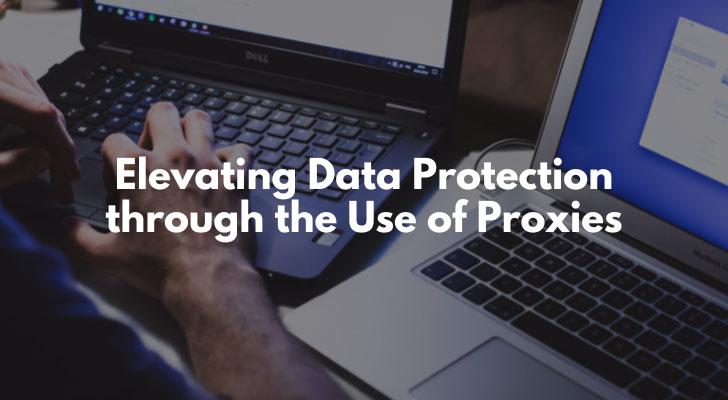A proxy server is a computer or software system that acts as an intermediary between your web server and the internet. When a user requests to access a website or online service, the request is sent to the proxy server first. The proxy server then sends the request to the internet on behalf of the user's device. When the website or service responds, the proxy server forwards the response back to the user's device.

Types of Proxy Servers
There are several types of proxy servers, each with its specific purpose and function. Some common types of proxies include:
HTTP proxy:
HTTP proxies are the most common type of proxies and are used to access websites and other web-based services. These types of proxies are the most compatible with websites so they’re the most abundant.
HTTPS proxy:
Also known as SSL proxies, HTTPS proxies are the newer version of HTTP proxies. An HTTPS proxy will encrypt any incoming and outgoing data which makes it one of the most secure proxy types available. HTTPS proxies are best for when you want to avoid getting banned by websites when you use automation tools like web scrapers and sneaker bots.
SOCKS5 proxy:
SOCKS5 proxies are one of the newest types of proxies that are available in the market now. These are the type of proxies that are used to access a variety of internet services, including email, instant messaging, and file transfer. SOCKS5 proxies are the best when you want to transfer data in real time.
VPN proxy:
A VPN proxy, which is different from a VPN service, is a type of proxy that is used to establish a secure, encrypted connection to the internet, often used for remote access to internal network resources. These types of proxies provide the best data encryption which provides you with greater security.
Proxies can be useful for a variety of purposes, such as improving online privacy and security, bypassing internet restrictions, scraping data from websites, allowing you to use automation tools without getting banned, and many more. For websites though, the biggest role of a proxy server is protecting it from cyber threats, like distributed denial-of-service (DDoS) attacks and other cyber attacks, and also from hackers and other malicious users.
Proxies have a crucial role in cybersecurity, as it provides an extra layer of protection for safeguarding your data and sensitive information. A proxy server allows you to send and receive data without directly exposing your IP address. This added layer of security can help to keep your personal information and online activity private and secure.
How Proxies Can Help Elevate Data Protection

Here are a few ways that proxies can help to elevate data protection for your website:
Improved security:
Proxies act as a barrier between your company's network and the internet, providing an extra layer of protection against cyber threats such as hacking and malware. The proxy server will filter out any user with suspicious activity and block out already known malicious IP addresses.
Increased privacy:
Proxies will give you total anonymity as they can hide your company's IP address and encrypt internet connections, making it more difficult for third parties to intercept your data. Your online activities will also be completely hidden from any prying eyes
Bypass geo-restrictions:
Websites sometimes have restricted content that’s only available for certain locations. Proxies can be used to access content that is blocked in your country, such as news websites or social media platforms, allowing your company's employees to access the information they need to do their job.
Lesser bandwidth and faster speed:
Proxies can help to reduce the amount of bandwidth your company uses, which can lower internet costs. They can also help to improve the performance of your company's website by data caching frequently-requested content, which basically loads web pages that have been previously visited by a user.
Access control:
Proxies can be used to restrict access to certain websites or online services, based on predefined policies. This can be useful for preventing employees from accessing sites that may be a security risk, such as social media or gaming sites, during working hours.
Content filtering:
Proxies can be configured to filter out or block certain types of content, such as spam or potentially malicious websites. This can help to keep your network free from malware and other cyber threats.
Data leakage protection:
Proxies can be used to monitor and control the flow of sensitive data, such as personal information or financial data, in and out of your network. This can help to prevent data breaches and protect against data leakage.
Auditing and compliance:
Proxies can log and record all internet traffic, allowing you to track and monitor user activity, and ensuring that your organization complies with any relevant regulations or laws. You can monitor what websites your employees are accessing during working hours, and also what web applications they’re connecting to the internet with.
Remote access:
Proxies can be used to provide remote access to internal network resources, such as file servers and databases while still maintaining a secure connection. This can be particularly useful for companies where the majority of employees are working from home or on the road.
It's important to keep in mind that not all proxies are created equal, and it's important to choose a reputable provider that guarantees the quality and accuracy of their proxies for data protection. Proxies from a reputable proxy provider’s free proxy server list may even be more desirable compared to a private plan from a suspicious and untrustworthy provider.
In addition, it's important to have a comprehensive data security plan in place, including regular backups, training of employees on security best practices, and regular testing of systems to ensure they are secure.
Summary
In summary, proxies are an indispensable part of protecting your website and data from cyber threats. It can help elevate data protection by improving security and privacy, providing access control, content filtering, data leakage protection, auditing and compliance, and remote access to internal resources while maintaining a secure connection. It's important to choose a reputable provider and have a comprehensive data security plan in place.
Did You Know You Already Have A LOT To Sell?
So What's Your Problem?


